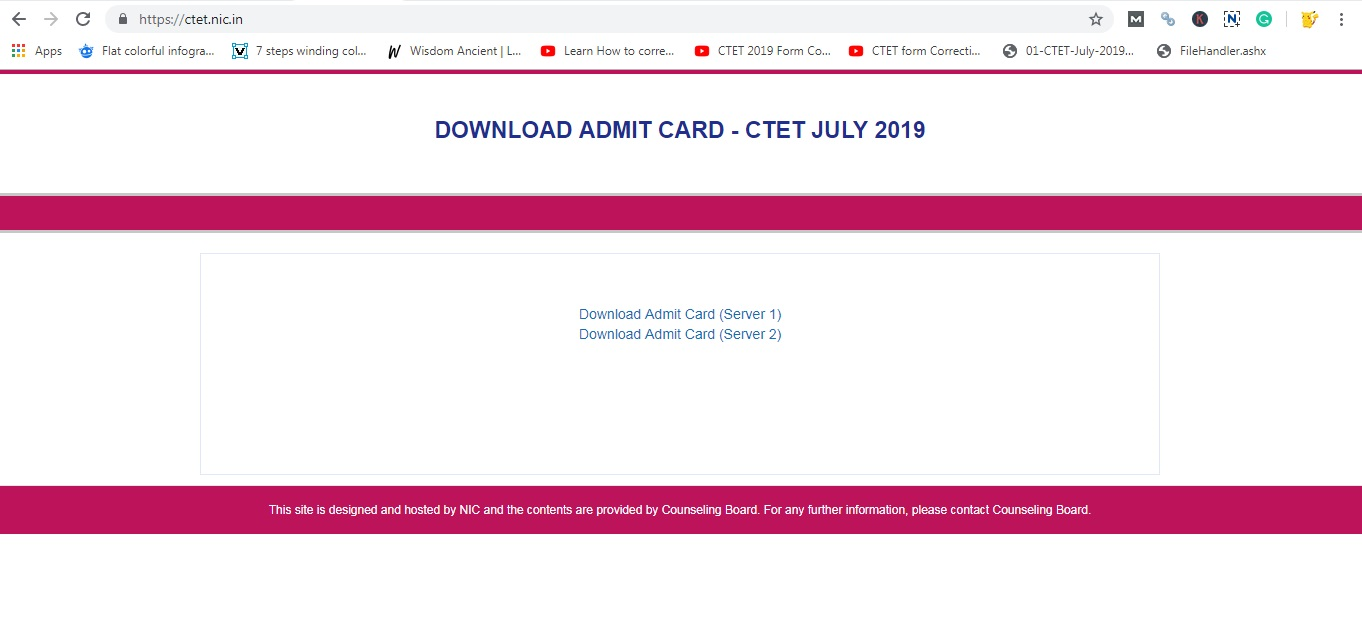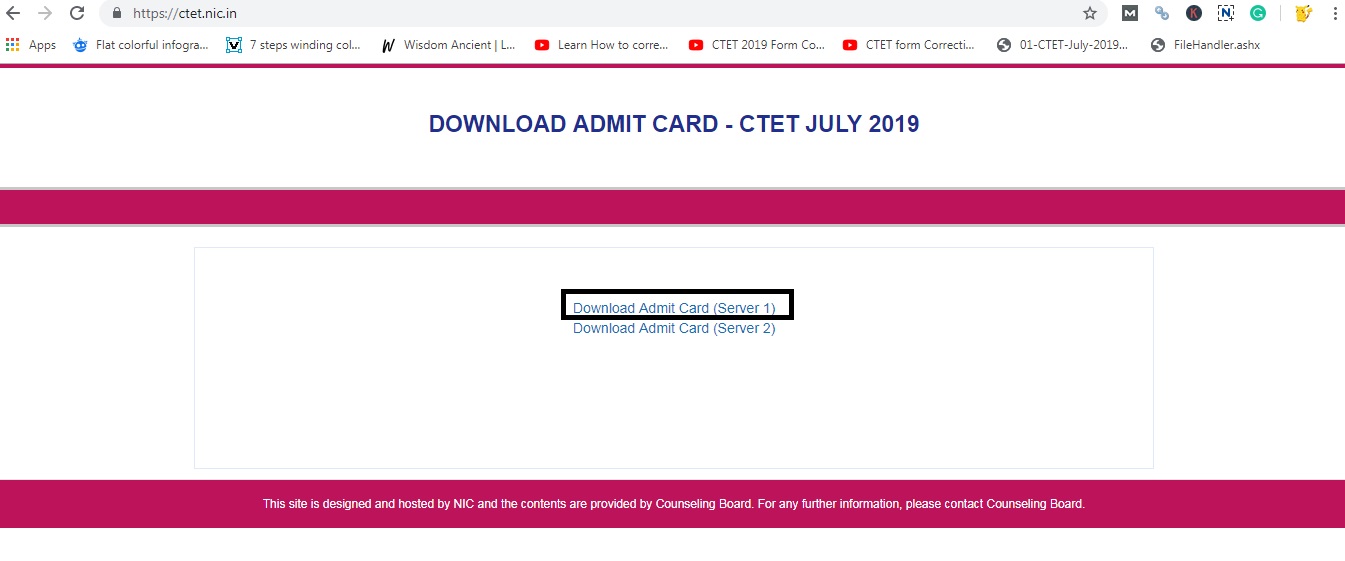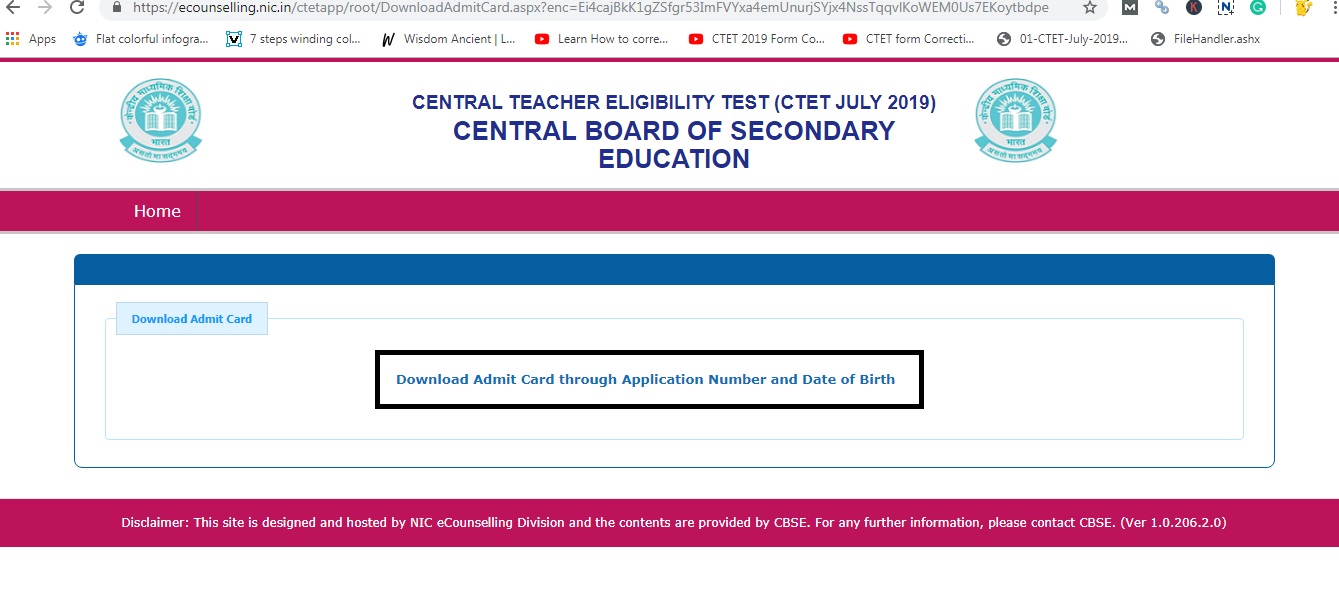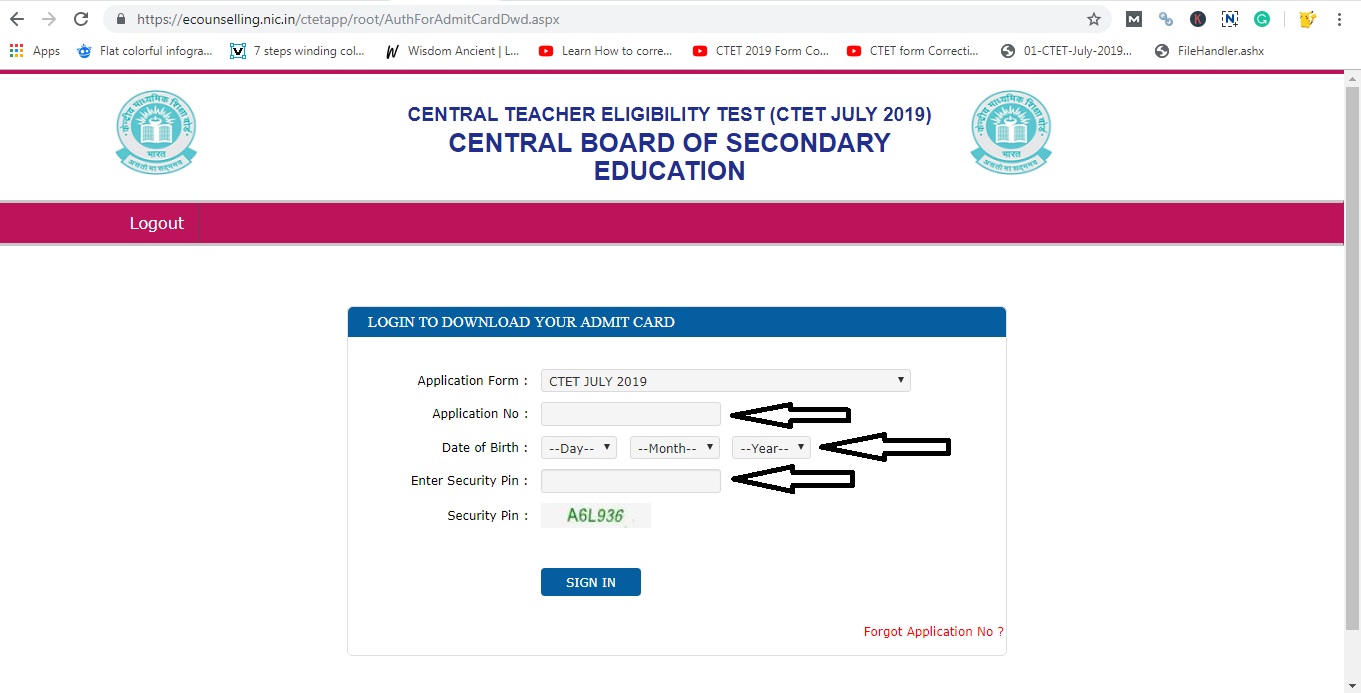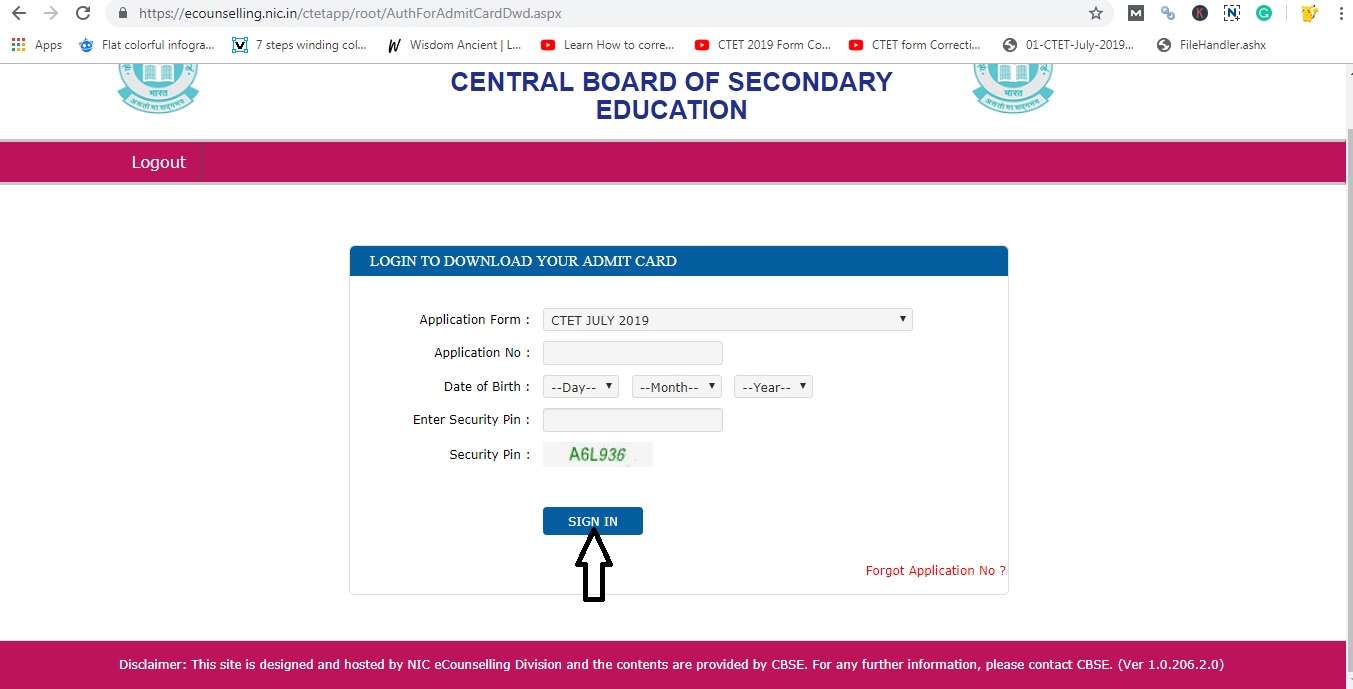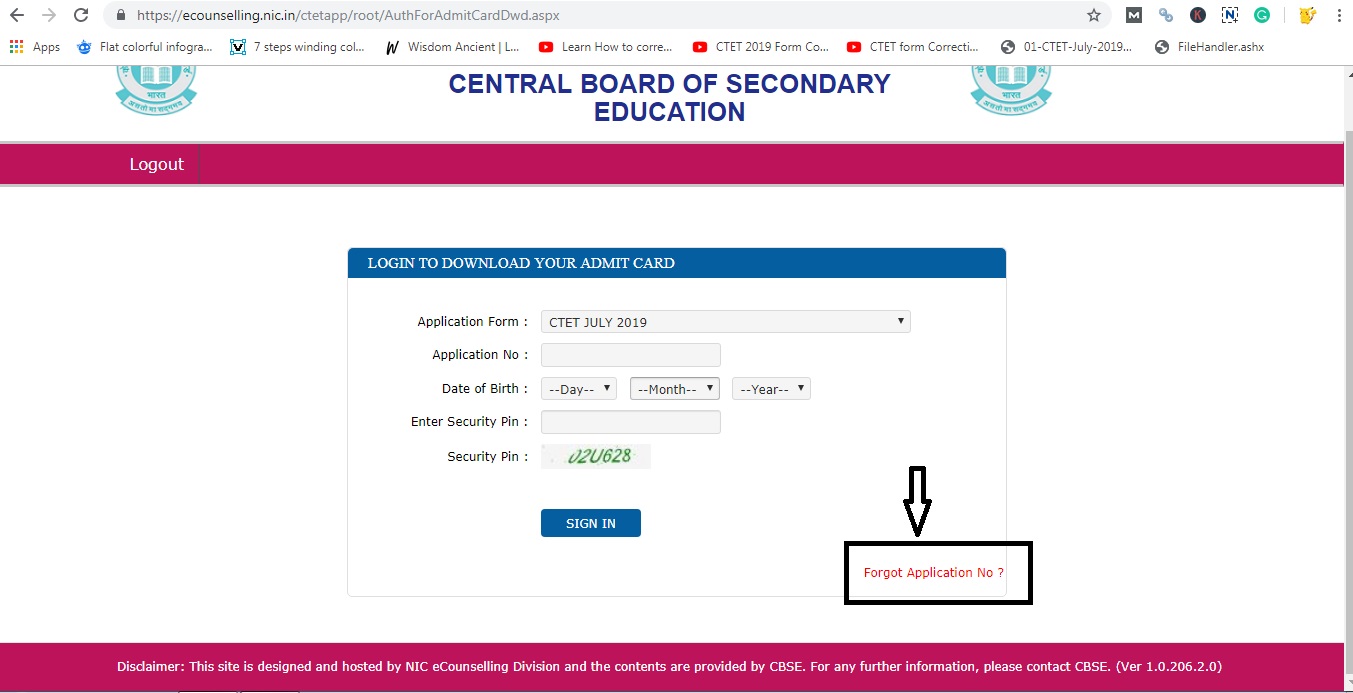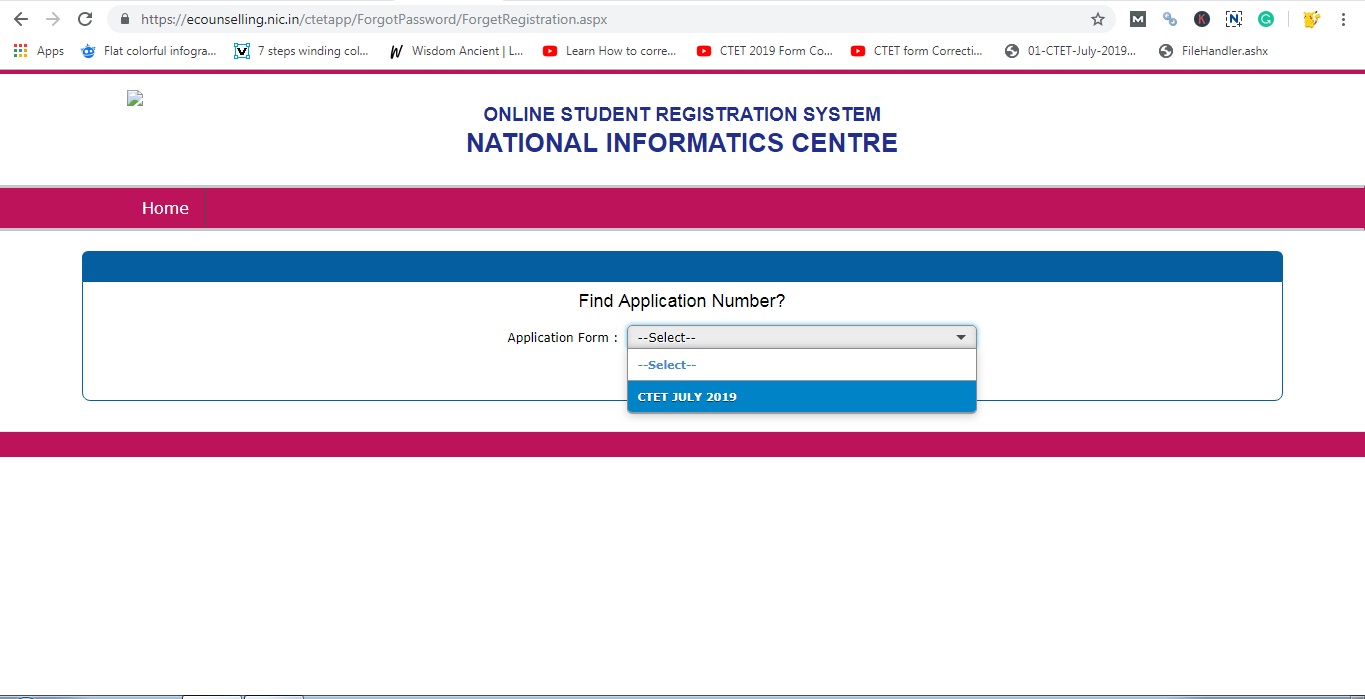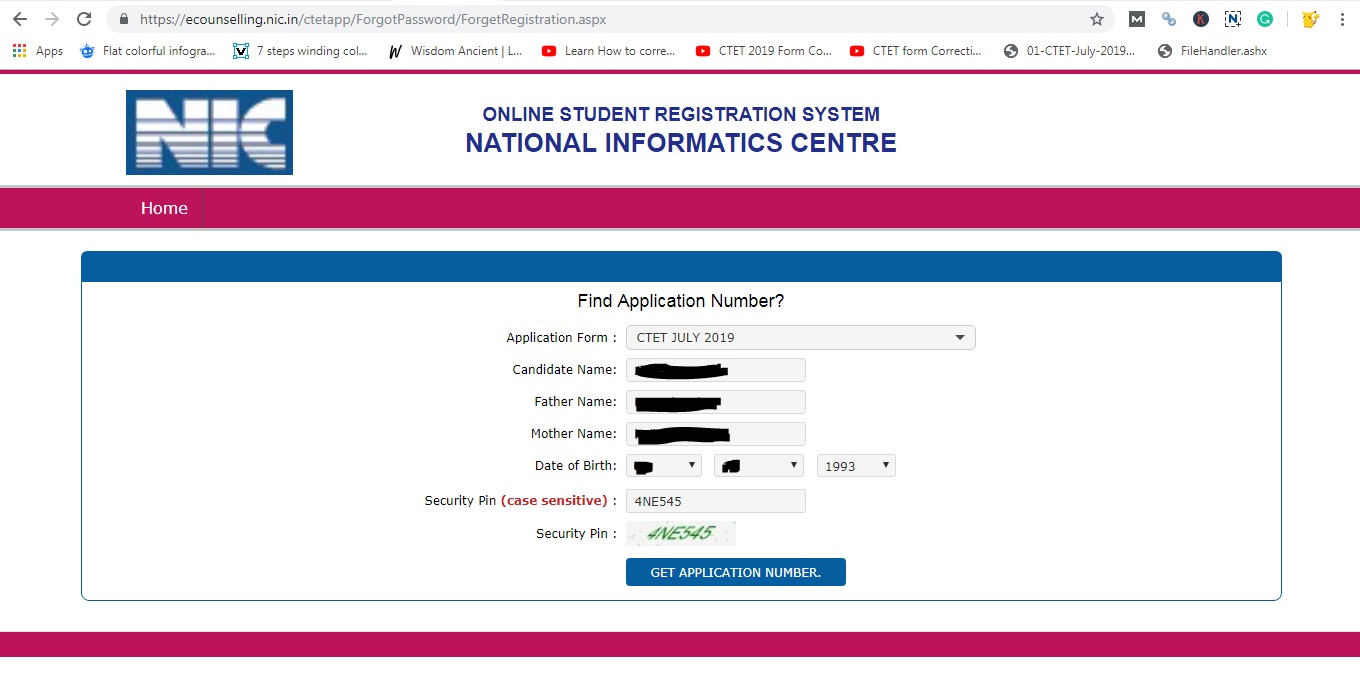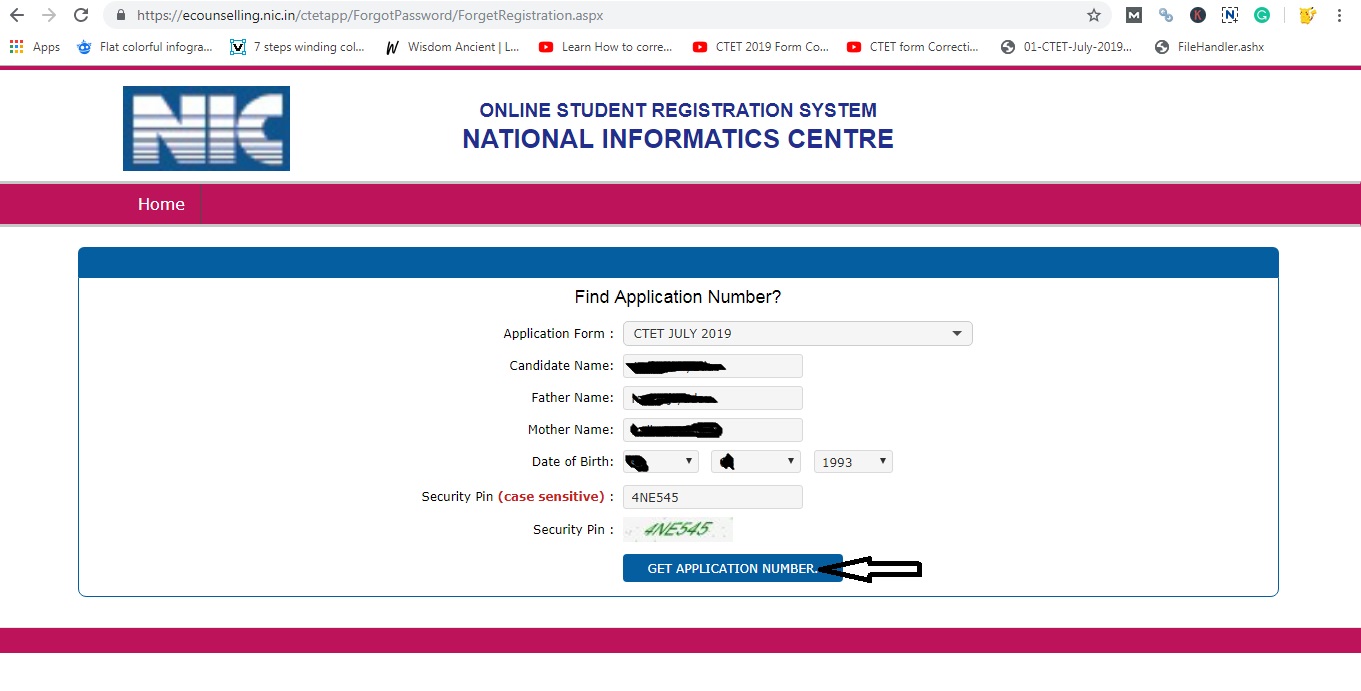- June 20, 2019
- Posted by: Archana
- Category: Article

Guess how many students apply for CTET Exam every session.
Any ideas?
Well, approx 17 lakh students appeared for CTET exam for class 1 to 8 every session. In which, 7.13 lakh applicants were male and 9.8 lakh students were female.
No wonder millions of people Fill forms every day. But the question is how to decide that you should have to fill this form only?
And what does CTET even mean?
Most of the people know what it stands for Central Teacher Eligibility Test, but what you have to do to apply for CTET?
Do you have to check eligibility? Or Register on the website? Or fill the application form?
The answer to all of these questions is yes, yes and yes. You have to go through with all these steps.
Now, Lets starts how to do it?
As we all know the CTET Exam is the famous exam all over India which refers to the Central Teacher Eligibility Test. As its name suggests, This Exam is conducted for recruiting teachers for central schools such as Navodya School, Army School, Kendriya Vidyalaya etc.
CTET Exam conducted by CBSE Delhi which follows the guidelines declared by The Ministry of Human Resource Development, Govt. of India.
Now, CTET Exam held once in a year but before some time it was conducted two times in a year.
CTET Exam conducted in 20 languages which held in 97 cities all over India.
CTET exam is for those candidates who have a dream to be a teacher and want to make their career in the teaching field.
Now we’re going to deep in CTET Exam but you can also jump to any section which you want to read.
- Highlights
- Exam Date and Time
- Eligibility Criteria
- Application 2020: How To Apply
- Exam Centres
- Exam Pattern
- Syllabus
- Question Paper
- Admit Card
- Answer Key
- Result
- Qualifying Marks
- Cut Off
Overview
Now let’s see it how does that magic look like.
As we said earlier CTET 2020 Exam conducted for recruitment of teachers at Primary level and Upper Primary level in all over India. That’s why it is known as a national level entrance examination.
CTET Conducted by Central Board of Secondary Education (CBSE) via offline mode.
To apply for CTET candidates have register yourself on CTET official website. Application Form for CTET 2020 Exam will be available on the official website of CTET.
Before applying for CTET students must fulfil the eligibility criteria for this particular exam. Candidates must have scored 50% marks in graduation and should also a B.Ed degree for CTET 2020.
Admit Card of CTET 2020 will be available before 15 days of the exam and downloaded from the CTET official website. CTET Exam date and time will be mentioned on the CTET Admit Card.
Students can also do the corrections in their CTET Application Form or CTET Form. Authority of CTET will open the CTET official website for a limited period of time to do the corrections.
Candidates can appear in two papers of CTET Exam as per their choices – Paper I and Paper II. Paper I is for those students who apply for Class I to V and Paper II for Class VI to VIII. Students who want to teach both levels have to appear in both papers.
Every CTET Paper have 150 questions which carry 150 marks. After qualifying CTET Exam candidates will get TET Eligibility Certificate which is valid for 7 years.
CTET Exam Highlights
| Exam Name | Central Teacher Eligibility Test (CTET) |
| Conducting By | Central Board of Secondary Education (CBSE) |
| Exam Type | National Level |
| Objective | Shortlist Primary and Elementary Teachers in Central Government Schools |
| Exam Duration | 2 hours 30 minutes (150 minutes) for both papers |
| Application Mode | Online |
| Negative Marking | No |
| Medium of Language | English and Hindi |
| Eligibility | UG/PG + D.Ed./B.Ed |
| CTET Exam Mode | Offline |
| No. of Test Cities | 97 cities across 36 states/UT in India |
| Registration Dates | 24 Jan to 24 February 2020 |
| CTET Exam Date | July 5, 2020 |
| CTET Helpdesk Number | 011-22235774 |
| CTET Website & Email | https://ctet.nic.in/CMS/Public/Home.aspx directorctet@gmail. com |
Here are the basic highlights of CTET exam which you have to know to get into CTET. Now Let’s get to know about how to apply for CTET Exam and what is the eligibility criteria to fill the CTET Application Form.
But before we can jump in and see how you can fill the CTET online application form, you should first know about some important dates of CTET Exam.
CTET Exam Date and Time
Candidates can get all important Exam Date and Time of CTET Exam like registration date, application date, admit card date, exam date, result date and counselling date etc.
CTET Exam Dates
| Event | Date | Description |
|---|
| Past | 01/01/70 | CTET Admit Card Download |
| Past | 07/05/20 | Exam Date 2020 |
| Past | 25/07/20 | Declaration of Result (Tentative) |
| Past | 30/07/20 | CTET 2020 Certificate Dispatch (Tentative) |
| Past | 05/02/20 | Online Application starts |
| Past | 03/03/20 | CTET Last Date to fill application form |
| Past | 08/03/20 | Application of CTET Fee payment last date |
| Past | 07/04/20 | Period of online corrections (No corrections will be allowed under any circumstances after this date) |
Exam Time / Exam Schedule
| Exam Date | Paper | Timing | Duration |
| July 5, 2020 | Paper-I | 9:30 am to 12:00 noon | 2:30 Hours |
| July 5, 2020 | Paper-II | 2 pm to 4:30 Hours | 2:30 Hours |
| Events | Paper I | Paper-II |
| CTET Exam Date | July 5, 2020 | July 5, 2020 |
| CTET Exam Centre Entry Starts | 8:00 AM | 12:30 PM |
| Admit Cards Checking at Exam Centre | 09: 00 AM to 09:15 AM | 01:30 PM to 01:45 PM |
| Test Booklet Distribution Starts | 9:15 AM | 1:45 PM |
| Test Booklet Seal Broken and take out the Answer Sheet | 9:25 AM | 1:55 PM |
| Examination Centre Last Entry | 9:30 AM | 2:00 PM |
| Test Commences | 9:30 AM | 2:00 PM |
| Test Concludes | 12:00 PM | 4:30 PM |
We have mentioned here all the Exam Dates and Time of CTET Exam. Candidates are advised to reach at the given time on the exam centre. Otherwise, they will not be entertained to appear in the CTET Exam.
To appear in the exam candidates have to apply for and fill the CTET application form.
But to understand how to apply for CTET Exam, you first need to know what is the CTET Eligibility Criteria.
CTET Exam Eligibility Criteria
CTET Eligibility is mandatory for both Paper 1 and Paper 2 which is announced by CBSE authority.
Basic Eligibility Criteria for CTET is that candidates should have passed their senior secondary or score at least 50% aggregate marks in their graduation and relevant teacher training program.
CTET Exam Eligibility: Educational Qualification Criteria
CTET Eligibility Criteria for Primary and Elementary Stage are mentioned below:

Academic Qualification for Class 1 to 5 Teachers (Primary Stage)
- Students must have scored at least 50% marks in their Senior Secondary and passed or in final year of 2- year Diploma in Elementary Education.
OR
- Students must have scored at least 45% marks in their Senior Secondary and passed or in the final year of 2- year Diploma in Elementary Education in accordance with the NCTE (Recognition Norms and Procedure), Regulations, 2002.
OR
- Students must have scored at least 50% marks in their Senior Secondary and passed or in the final year of 4- year Bachelor of Elementary Education (B.EI.Ed).
OR
- Students must have scored at least 50% marks in their Senior Secondary and passed or in the final year of 2- year Diploma in Education (Special Education).
OR
- Students must have scored at least 50% marks in their Graduation and Bachelor of Education (B.Ed).
Those candidates who fulfil any of these Educational Qualification Criteria for Primary Stage can apply for the CTET Exam.

Academic Qualification for Class 6 to 8 Teachers (Elementary Stage)
Candidates who want to appear in CTET 2020 for Elementary Stage (Class 6 to 8) must have to fulfil these below given Eligibility Criteria.
- Candidates must have completed their Graduation and passed or appearing in the final year of 2-year Diploma in Elementary Education.
OR
- Candidates must have scored at least 50% marks in their Graduation and passed or appearing in the final year of 1-year Bachelor in Education (B.Ed).
OR
- Candidates must have scored at least 45% marks in their Graduation and passed or pursuing Bachelor in Education (B.Ed) in accordance with the NCTE (Recognition Norms and Procedure).
OR
- Candidates must have scored at least 50% marks in their Senior Secondary and passed or appearing in the final year of 4- year Bachelor in Elementary Education (B.EI.Ed).
OR
- Candidates must have scored at least 50% marks in their Senior Secondary and passed or appearing in the final year of 4- year B.A/B.Sc.Ed or B.A.Ed/B.Sc.Ed
OR
- Candidates must have scored at least 50% marks in their Graduation and passed or appearing in 1-year B.Ed. (Special Education).
Any candidates who have fulfilled any of the CTET Eligibility criteria for Elementary Stage are eligible to apply online for CTET exam 2020.
Now you have some idea about CTET Exam. So, do not waste your time we will let you go forward to CTET Online Application Procedure. Then, you can use the steps at the end for How to fill CTET Form.

CTET Exam Application 2020: How To Apply
CTET Application Forms are available on the CTET website. Before filling CTET online form candidates are advised to check their eligibility criteria.
To Apply for CTET 2020, candidates have to log in on CTET official website and fill CTET Application Form 2020. Then students have to click on the link ‘Apply’ and should read all the instructions carefully. After that, Students click on declaration checkbox and click on the link “Click here to Proceed”.
Corrections in CTET Online Forms are also available. Candidates can do the correction before April 7, 2020.
Now that you have an idea of the basics of CTET Application, We’ll take a look at some of its steps to fill CTET Application Form in detail.
Step 1: Apply for CTET Exam Registration Online
- Visit CTET official website
- Click on link Apply Online.
- Registered Candidates can Sign In by providing all the necessary details and Security Pin.
- Now, Select Application Form and click on Apply.
- Read all the instructions carefully and click on declaration checkbox.
- And, should be Click on the link “Click here to Proceed”.
Step 2: Fill the CTET Exam Online Application Form
- After clicking on the Proceed button, An Application Form will be opened.
- Fill all the necessary details carefully.
- Then click on the ‘Next’ button.
- If you want to fill details again then you can click on Reset Button.
- A Review Page will be opened. Review all the details carefully.
- Then, Click on the ‘Final Submit’ button.
After Final submission, Candidates will get a registration number. Candidates have to remember this registration number as it would be used in future.
Details filled in CTET Exam Online Application Form 2020
- Candidate’s particulars
- Examination Center
- Languages offered
- If Differently Abled
- Personal details
- College Institution
- Address and contact
- Security PIN
Step 3: Upload Scanned Photo & Signature
After filling CTET Application Form 2020, Candidates have to jump to the next step in which they have to upload their documents. We have mentioned the list of documents beneath:
- Latest scanned passport size photograph in JPEG Format. (Size should be 10 kb to 100 kb and dimensions should be 3.5 cm x 4.5 cm).
- Scanned Signature in JPEG Format. (Size should be 3 kb to 25 kb and dimensions should be 3.5 cm x 1.5 cm)
Note: Candidates can only edit their application form until they do not make the payment for CTET. When CTET payment has been done, candidates cannot edit their application.
But candidates can do the corrections when the portal will be opened for online correction as per the given schedule of CTET July 2020. No, any corrections or changes will be accepted via offline mode such as through fax/application or by email etc.
Step 4: Pay CTET Examination Fee
- After Uploading the Photograph and Signature images, an application or examination fee page will be opened.
- Now, Candidates can pay the application fee either of the two means mentioned below:
- Via E-Challan: In this, Candidates can pay the application fee with Syndicate Bank or Canara Bank by depositing the fee amount in the CTET Exam Fee Account.
- Via Debit/Credit Card/Net banking: Candidates can do itself online.
Application Fee
| Category | For Only Paper I or II | Both Paper I & II |
| For General / OBC Category | Rs. 700 /- | Rs. 1200 /- |
| For SC / ST / Differently Abled Category | Rs. 350 /- | Rs. 600 /- |
Note:- GST will also be applicable and will be charged extra by the Bank.
Step 5: Download or Print Confirmation Page
After payment candidates have to click on proceed to download the Confirmation Page.
Download and keep this Confirmation Page with the copy of e-challan or the fee receipt for future preferences.
These All five Steps are mandatory to fill the CTET Application form. Online application submission will be considered as complete only if candidates receive or print the receipt of “Confirmation Page”.
If Confirmation Page not showing or generated then candidates can contact to the Joint Secretary of CTET exam, CTET Unit, CBSE in between 10 am to 5 pm from March 14, 2020, to March 20, 2020.
Candidates have to provide proof of the payment of fee either via Bank Challan or through Credit/ Debit Card for considering your candidature for CTET EXAM July 2020.
But how can you get the details about CTET Exam Centres?
That’s what we’re going to talk about next.
CTET Exam Centres
CTET 2020 Exam held in two shifts (morning and evening shifts) in 97 cities all over India. Last year CTET exam conducted in 92 cities and now 5 cities more addon in the list.
- Candidates have the option to choose up to 3 exam centre preferences of their choice while doing online registration/ application form fill up.
- Exam centre will not change after the allocation. It will only be changed by the Board under any circumstances.
- Candidates should have to carry admit card at the exam centre.
- CTET Provide exam centre at every major location of India. Candidates can select their exam centres as per their convenience.
- If in any city candidates are very less for running the Exam Centre then there’s a chance that CBSE Board may not conduct the Examination in that City. And candidates who choose those cities first priority may be allotted 2nd or 3rd choice exam centre city.
- CBSE has the rights to allot, add and cancel the exam centres of CTET Exam and one exam city of CTET can have multiple exam centres.
- CTET Exam Centre is mentioned on the Candidates Admit Card of CTET exam.
To further help you do that, now we’re going to look at over CTET Exam Pattern that will inspire you to score more in CTET Exam and also helps to your Preparations.
CTET Exam Pattern
CTET national level exam held in two levels one is Paper 1 (Primary Stage) and second is Paper 2 (Elementary Stage). Both of the levels papers are conducted on a single day in different shifts.
Paper 1 is conducted for those students who want to teach class 1 to class 5 and paper 2 is for those students who want to teach class 6 to class 8.
Those candidates who want to teach both level students then they appear in both the papers in CTET exam.
Candidates secured at least 60% and above marks in CTET are eligible to get issued eligibility certificate to being a teacher.
Paper 1 for CTET has 5 Sections whereas Paper 2 has only 4 Sections. Candidates have to choose one subject between these subjects Mathematics & Science and Social Studies.
| Paper | Type of Questions | Duration of Exam | Sections | Total marks | Marking scheme | Negative Marking |
| I | Multiple Choice Questions (MCQs) | 2.5 hours (150 minutes) | 1. Child Development and Pedagogy 2. Language I (compulsory) 3. Language II (compulsory) 4. Mathematics 5. Environmental Studies | 150 marks | 1 mark for the correct response | No deduction |
| II | Multiple Choice Questions (MCQs) | 2.5 hours (150 minutes) | 1. Child Development and Pedagogy 2. Language I (compulsory) 3. Language II (compulsory) 4. Mathematics & Science 5. Social Studies/Social Sciences | 150 marks | 1 mark for the correct response | No deduction |
Marking Pattern
CTET 2020 both papers contains 150 questions carrying 150 marks. Candidates can get the details about the subjects and number of questions asked from given below table.
Paper 1: Selection for Class 1 to Class 5
| Subject | No. of Questions | Marks |
| Child Development and Pedagogy | 30 MCQs | 30 Marks |
| Language I (compulsory) | 30 MCQs | 30 Marks |
| Language II (compulsory) | 30 MCQs | 30 Marks |
| Mathematics | 30 MCQs | 30 Marks |
| Environmental Studies | 30 MCQs | 30 Marks |
| Total | 150 Questions | 150 Marks |
Paper 2: Teachers for Class 5 to 8 (For Mathematics and Science Teacher)
| Subject | No. of Questions | Marks |
| Child Development & Pedagogy(compulsory) | 30 MCQs | 30 Marks |
| Language I (compulsory) | 30 MCQs | 30 Marks |
| Language II (compulsory) | 30 MCQs | 30 Marks |
| Mathematics and Science (for Mathematics and Science teacher) | 60 MCQs | 60 Marks |
| Total | 150 Questions | 150 Marks |
Paper 2: Teachers for Class 5 to 8 (For Mathematics and Science Teacher)
| Subject | No. of Questions | Marks |
| Child Development & Pedagogy(compulsory) | 30 MCQs | 30 Marks |
| Language I (compulsory) | 30 MCQs | 30 Marks |
| Language II (compulsory) | 30 MCQs | 30 Marks |
| Social Studies/Social Science (for Social Studies/Social Science teacher) | 60 MCQs | 60 Marks |
| Total | 150 Questions | 150 Marks |
I’ve briefly talked about the CTET Exam Pattern and CTET Syllabus already, but they are worth mentioning in a bit more depth.
Syllabus
As we all know, For preparing any exams we all just need some guidance which is provided by the Syllabus and Exam Pattern.
Syllabus and Exam Pattern contains the details related to the subjects and topics which were covered in the examinations.
So preparation for Central Teachers Ability Test (CTET 2020-21), CTET Syllabus plays the most important role.
Candidates aspiring to teach Classes 1st to 5th (Primary Stage) must have to appear in Paper I and Candidates aspiring to teach Class 6th to 8th (Primary Stage) must have to appear in Paper-II.
Syllabus for Paper I:
CTET Paper 1 Syllabus includes 150 Multiple Choice Questions which carries 150 marks. CTET Paper 1, MCQs picked from five major Subjects which are Child Development and Pedagogy, Language I, Language II, Mathematics, Environmental Studies. Here we have listed out the subjects and topics from which CTET 2020 MCQs covered.
| Subject | Section | Topics | Number of questions |
| Child Development and Pedagogy | Development of a Primary School Child |
| 15 |
| Concept of Inclusive education and understanding children with special needs |
| 5 | |
| Learning and Pedagogy |
| 10 | |
| Language 1 | Language Comprehension | Reading unseen passages – two passages one prose or drama and one poem with questions on comprehension, inference, grammar and verbal ability (Prose passage may be literary, scientific, narrative or discursive) | 15 |
| Pedagogy of Language Development |
| 15 | |
| Language 2 | Comprehension | Two unseen prose passages (discursive or literary or narrative or scientific) with a question on comprehension, grammar and verbal ability. | 15 |
| Pedagogy of Language Development |
| 15 | |
| Mathematics | Content |
| 15 |
| Pedagogical issues |
| 15 | |
| Environmental Studies | Content |
| 15 |
| Pedagogical Issues |
| 15 |
CTET Exam Syllabus 2020 for Paper-II:
CTET Paper 2 Syllabus includes 150 MCQs which carries 150 marks. Here we have listed out the subjects and topics from which CTET 2020 MCQs covered.
| Subject | Section | Topics | Number of questions |
| Child Development and Pedagogy | Development of a Primary School Child |
| 15 |
| Concept of Inclusive education and understanding children with special needs |
| 5 | |
| Learning and Pedagogy |
| 10 | |
| Language 1 | Language Comprehension | Reading unseen passages – two passages one prose or drama and one poem with questions on comprehension, inference, grammar and verbal ability (Prose passage may be literary, scientific, narrative or discursive) | 15 |
| Pedagogy of Language Development |
| 15 | |
| Language 2 | Comprehension | Two unseen prose passages (discursive or literary or narrative or scientific) with a question on comprehension, grammar and verbal ability. | 15 |
| Pedagogy of Language Development |
| 15 | |
| Mathematics and Science | Mathematics | Content – (20 Questions)
Pedagogical issues – (10 Questions)
| 15 |
| Science | Content – (20 Questions)
Pedagogical issues – (10 Questions)
| 15 | |
| Social Studies/Social Sciences | Content | History:
Geography:
Social and Political Life:
| 15 |
| Pedagogical Issues |
| 15 |
Now we are going to show you how you can prepare yourself and build your speed, accuracy with CTET Question Paper. Then, you can use the CTET Question Paper for the preparation.
CTET Exam Question Paper
CTET Question Papers and Sample Papers are useful to understand exam pattern and help to prepare better for the CTET exam. Candidates can try these CTET Question Papers to get a clear idea of the major topics trending over the years and also increase their speed, accuracy.
By solving CTET Question Papers, candidates become familiar with the answering of the questions asked from syllabus of CTET. Question papers, as well as an answer key for both Primary and Upper Primary Teachers Exam, are available on the official website of CTET after completion of both exams.
These CTET Question Papers will be officially released by the Central Board of Secondary Education. Candidates can check the correct answer of all the questions of both Paper I (for Primary Teachers) and CTET Paper II (for Upper Primary Teachers) examination with the help of official CTET answer key.
CTET Exam Question Papers Year wise
We have listed out CTET Question Papers Year wise which is helpful for candidates to qualify CTET Exam. You can find here Question papers for both Paper I and Paper II free of cost. Download CTET Question Papers for all subjects in all languages absolutely free from below given links.
| Session | Paper I Link | Paper II Link |
| CTET – NOV 2012 Question Paper | Paper I | Paper II |
| CTET – JULY 2013 Question Paper | Paper I | Paper II |
| CTET – FEB 2014 Question Paper | Paper I | Paper II |
| CTET – SEPT 2014 Question Paper | Paper I | Paper II |
| CTET – FEB 2015 Question Paper | Paper I | Paper II |
| CTET – FEB 2016 Question Paper | Paper I | Paper II |
| CTET – MAY 2016 Question Paper | Paper I | Paper II |
| CTET – SEP 2016 Question Paper | Paper I | Paper II |
Why Previous Year Question Paper Of CTET is Used?
CTET Question Paper is used to solve them within the time limit as per the prescribed exam pattern. It helps students to improve their time management skills.
Candidates should have to take the Print of the CTET Question papers and a sample OMR sheet. Then set a timer and start attempting questions one by one.
After time completed students have to check their answers from CTET answer key and how many questions they answered correctly.
After that candidates have to analyse those questions which are wrong and not attempted and they should have to attempt them again.
By using this method candidates can understand the exam pattern, types of questions and also improve their speed and accuracy.
Importance of CTET Exam Previous Year Question Paper
As we all know Every year lots of people appear in CTET exam but only some of them can crack it. The Qualifying marks of CTET Exam are 60% as who got this score can qualify Central Teacher Eligibility Test.
Now, You think you can do it! Right?
But to qualify this, you must know various other things about the CTET exam which are exam pattern, types of questions, difficulty level etc.
CTET Previous Year Question Paper also plays an important role in this. By solving CTET Question Papers you can get ideas of various things such as:
- Understanding of Exam pattern of CTET Exam.
- Knows the Difficulty level after attempting previous year papers of CTET.
- Can get an idea of what type of questions come in CTET exam.
- Analyse their performance level and improve their preparation strategy accordingly.
- Give more time to those portions in which they are weak.
- Improvement in time management for the exam.
CTET Exam Admit Card
We all know that Admit Card is a mandatory thing for any kind of examination. Candidates have to carry Admit Card at the time of examination and at the examination centre. Without Admit Card candidates are not entertained to appear in examinations.
As apply on CTET Exam, Candidates have to carry CTET Admit Card at the examination hall. CTET Admit Card is available on the official website of Central Teacher Eligibility Test. Admit Card of CTET exam has been issued and released by the Central Board of Secondary Education (CBSE) on June 21, 2020.
CTET Admit Card is issued to those students who have filled and submit the CTET application form. To download CTET Admit Card candidates have to enter their registration number and date of birth on the official website of CTET
Admit Card Date
CBSE has been released the CTET Admit Card 2020 on June 21, 2020. Candidates can download the CTET Admit Card by entering their Application Number and Date of Birth. CTET Admit Card is issued to successfully registered students.
Exam Day Schedule
| Paper I | Paper-II | |
| Examination Hall Entry | 8:00 AM | 12:30 PM |
| Admit Cards Checking | 09:00 AM to 09:15 AM | 01:30 PM to 01:45 PM |
| Test Booklet Distribution | 9:15 AM | 1:45 PM |
| Seal of Test Booklet broken and take out the Answer Sheet | 9:25 AM | 1:55 PM |
| Last Entry in Examination Hall | 9:30 AM | 2:00 PM |
| Exam Starts | 9:30 AM | 2:00 PM |
| Exam End | 12:00 Noon | 4:30 PM |
How To Download CTET Exam 2020 Admit card
CTET 2020 Admit card has been announced on the official website of CTET. Candidates have to visit the CTET online Portal to download the CTET Admit card 2020.
CTET Admit Card will be released online and there is no provision in CBSE to get CTET hall ticket offline. It is mandatory to carry the CTET admit card at the examination centre. Follow the steps given below to download CTET admit card 2020.
- Visit the official website of CTET

- Now there are two links provided on the page
- Download Admit Card (Server 1)
- Download Admit Card (Server 2)
- Then Click on any Download Admit Card link.

- After that, click on Download Admit Card through Application Number and Date of Birth.

- Now, Enter your Application Number, Date of Birth and Security Pin.

- Then, Click on Sign In button.

- CTET Admit card will appear on the screen.
- Download your CTET Admit card & Take a print out of it.
If any candidates facing issues related to CTET 2020 Admit Card details or cannot download the CTET Hall Ticket then they can contact to the CBSE authority immediately.
Candidates can directly Download CTET Admit Card from here.
What to do if you have Forgotten your CTET Exam Application Number?
CBSE also has the provision the get the CTET Application Number again. Candidates who have forgotten or lost their CTET Application Number can get again by visiting the official website of CTET. Just follow the below-given steps to know the CTET Application Number.
- Visit the official website of CTET

- Now there are two links provided on the page
- Download Admit Card (Server 1)
- Download Admit Card (Server 2)
- Then Click on any Download Admit Card link.

- After that, click on Download Admit Card through Application Number and Date of Birth.

- Now Click on Forgot application number.

- Then, Select Application Form which is CTET July 2020.

- Now, Enter Candidate Name, Father Name, Mother Name, Date of Birth and Security Pin.

- Then, Click on Get Application Number.

- Your Application Number will be displayed on the screen.
After getting Application Number you can follow the above steps to check and download CTET Admit Card.
Candidates can directly get CTET Application Number from here.
Documents required with CTET Exam 2020 Admit Card
Some of the candidates do not aware of the documents which they have to carry at the examination centre. Here we have listed out those things which will be mandatory to carry for Candidates to appear in the CTET Examination.
- CTET Admit Card/Hall Ticket
- Valid ID proof, such as
- Aadhaar Card
- Driving License
- PAN Card
- Passport
- Ration Card
- Voter ID
- Black of Blue Ball Point Pen

Details Printed on CTET Exam Admit Card 2020
After Downloading the CTET Admit Card, Candidates must be ensured that all the have details mentioned in the admit card should be correct. Candidates have to check the following below given details on their CTET hall ticket.
- Candidate’s Name, Sign & Photo
- Father’s name
- Centre number
- Address of Center of examination
- Registration number
- Date of birth
- Gender
- Category
- PWD Candidate (if applicable)
- Question paper medium
- Subject offered for Paper II
- Languages offered
- CTET Date and Time
- Mailing Address
- Paper
- Roll number
- Candidate’s photograph
- Exam instructions
If case candidates found any mistake in their CTET Admit Card then they have to contact to the CBSE authority immediately.
To further help you do that, now we’re going to look at over CTET Result 2020 that will help you to check result for CTET Exam.
CTET Exam Answer Key 2020
CBSE releases the CTET Answer Keys for Paper I and II when CTET examination has been completed. CTET Official Answer Keys are available on the official website of CTET which is released by CBSE in the last week of July 2020.
With the help of CTET Answer Key, Candidates can determine the number of questions they have answered correctly in CTET Exam. Candidates can also determine those question which they have not attempted correctly. By going through aspirants can get an idea of their score in CTET exam.
CBSE also has the provision to obtain a photocopy of OMR sheet of CTET 2020. CBSE updated the official CTET notification on the Website that candidates can get a photocopy of their OMR sheet of the CTET Exam 2020.
To get a photocopy of OMR sheet of CTET 2020, Aspirants have to pay the amount of Rs. 500 for every OMR sheet via demand draft in favour of Secretary, Central Board of Secondary Education which is drawn from any Nationalized Bank and payable at Delhi.
Many other private institutes or coaching centre, except CBSE, also releases unofficial answer key of CTET. Aspirants can get an idea about their performance in the CTET exam with CTET 2020 Answer Key. Now let’s find out how candidates can check and Download CTET 2020 Answer Key.
How to Download CTET Exam 2020 Answer Key?
Aspirants can predict their marks with the help of CTET answer key. Candidates can get the official answer key of CTET 2020 on the official website of CTET which is released by CBSE at the end of July 2020. Follow the below-given steps to Download CTET Answer Key 2020.
Steps to Download CTET Answer Key
- Visit the official website of CTET.
- After that, click on the displayed link “CTET 2020 Answer Key”.
- Now, Select paper code and click on the next tab.
- CTET 2020 answer key will be displayed on the screen
- Download CTET 2020 answer key and take a print out of the answer key.
CTET Exam Result
CTET Result is declared by the Central Board of Secondary Education (CBSE) on the official website of Central Teacher Eligibility Test (CTET) and CBSE. CBSE conducts CTET exam all over India two times in a year. But now CTET Exam is conducted once in a year.
CTET exam result will be declared separately for both papers
- Paper I (for Primary Teachers – Class I to V) and
- Paper-II (for Elementary Stage Teachers (Upper Primary) – Class VI to VIII).
Result of both CTET papers will be announced online on the official website of CTET and CBSE. Candidates have to provide their issued roll no./ registration no. to check CTET result 2020.
Now let’s go to deep dive into the CTET Results where you can see How to Check CTET 2020 Result, CTET Result Minimum Pass Mark, CTET OMR sheet evaluation process, CTET Result Score Applicability, CTET Result Validity Period etc. Check it out:
How to Check CTET Exam 2020 Result?
To check CTET 2020 Result candidates have to enter their roll number on the CTET official website. Candidates can follow these below given simple steps to check CTET 2020 Result.
- Visit the official website of CTET.
- Search the link ‘latest news’ and click on it.
- Click on news header which shows ‘CTET 2020 Result’.
- Then, You will be directed to a new page.
- Now, Enter your roll number in the space provided.
- Then, CTET 2020 Result will be displayed on the screen.
- Save/Print CTET result 2020 sheets for future preferences.
Details Present in CTET Exam 2020 Result
- Roll Number
- Name
- Father and Mother name
- Category
- Subject
- Mark Obtained in each subject
- Overall CTET Score
CTET Exam Result 2020: OMR sheet evaluation process
OMR sheet of students, who have appeared in CTET Exam, will be evaluated very carefully after the CTET Examination. Evaluation Authority makes sure that no students will be failed due to a mistake in the evaluation process. That’s why OMR answer sheets will be repeatedly scrutinized to avoid any mistakes in the previous evaluation procedure.
There is no provision for Re-checking, Re-assessment, Re-evaluation or Scrutiny of OMR answer sheets in CTET Exam. Request for these services will not be entertained for CTET exam.
CTET Exam Result 2020: Score Applicability
CTET Certification is applicable for all government school such as:
- Central Government Schools like Tibetan Schools, Kendriya Vidyalaya Sangathan (KVS), Navodaya Vidyalaya Samiti (NVS) etc.
- Schools under the Administrative Control of Union Territories of Chandigarh, Andaman & Nicobar Islands, Lakshadweep, Daman & Diu, Dadra & Nagar Haveli and NCT of Delhi.
- Unaided private schools who consider the CTET Exam option.
- State Government Schools/ local bodies and aided schools which consider the CTET if they decided not to conduct the State TET.
CTET Exam Result 2020: Validity Period
CTET Certificate is valid for seven years from the date of declaration of CTET Results for all category Students.
Candidates can attempt CTET exam many times that means there is nor restrictions for a number of attempts in this Exam.
Candidates who have qualified CTET exam can appear again in CTET exam to improve their score.
How to get Copy of CTET OMR Sheet/ Answer Key?
OMR sheet and the official answer key of CTET exam will be available on the official website of CTET after the examination held. OMR sheet contains the answers marked by candidates and Answer Key contains the correct answer of every question asked in the CTET examination.
To get their Copy of CTET OMR Sheet candidates to have to pay fees of Rs. 500/- per OMR sheet which is paid by demand draft in favour of Secretary, Central Board of Secondary Education drawn via any Nationalized Bank and payable at Delhi.
CTET Exam Result 2020: Qualifying Marks
Minimum passing marks of CTET exam is 60% for both CTET Paper I, Paper II. Candidates who score 90 marks out of total 150 marks will be considered as CTET qualified and they are eligible to get CTET certificate.
Whereas, It is mandatory that candidates have to secure minimum cut off marks which are decided by CBSE authorities. CTET Cut off marks are varied according to the various categories.
- Candidates who belong to SC/ST/OBC/Differently-abled categories can get relaxation up to 5% in the qualifying marks in the minimum educational qualification.
- To qualify the CTET exam candidates to have to score a minimum of 90 marks out of 150.
- School Management i.e. local bodies also provide concession in the marks of candidates belonging to reserved category in accordance with their existing reservation policy.
- Qualifying CTET exam is not a guarantee of getting a job of teaching in Government/ Local Schools. It is just an eligibility criterion which students have to fulfil to apply for teaching jobs.
Cut Off 2020
The cutoff is the required marks, which students have to get CTET certification. CTET Cut Off will be released after the declaration of the result of Paper 1 & 2.
WheneverCandidates should have to note that the Central Teacher Eligibility Test (CTET) exam will be qualified when they secured 60% or more in the CTET exam. It means candidates have to obtain a minimum of 90 marks out of a total of 150 in every CTET Paper.
CTET Exam will be held on July 5, 2020, and CBSE releasing the answer key for CTET 2020 after 5 days of the exam conduction. So candidates can expect the announcement of CTET Cut Off around late August 2020.
Candidates can get an idea of the expected CTET Cut Off 2020 by looking out previous year cut off for CTET Exam.
CTET Cutoff 2019
| Category | Cutoff |
| General | 87 |
| OBC | 85 |
| SC | 80 |
| ST | 80 |
However, Candidates can also check previous year cut off for CTET Exam, like Cutoff 2019, 2018, 2017, 2016. The student knows how much they have to score to qualify the Exam.
CTET Cutoff 2018
| Category | Cutoff |
| General | 90 |
| OBC | 85 |
| SC | 80 |
| ST | 80 |
CTET Cutoff 2017
| Category | Cutoff |
| General | 87 |
| OBC | 85 |
| SC | 80 |
| ST | 80 |
CTET Cutoff 2016
| Category | Cutoff |
| General | 80-87 |
| OBC | 78-85 |
| SC | 72-80 |
| ST | 70-80 |
CTET Cutoff 2015
| Category | Cutoff |
| General | 87 |
| OBC | 85 |
| SC | 80 |
| ST | 80 |
Factors Determining CTET Exam Cut off 2020
CTET Cutoff 2020 is depend upon various factors. Examination authority of CTET considered all the below given factors to release the CTET Cutoff which includes:
- Minimum Qualifying Marks
- Registered Candidates
- Appeared Candidates
- Eligible Candidates
- Vacancy to Appeared Candidates ratio
- Difficulty level of the exam

How to Check CTET Exam Cut off 2020
CTET Cut Off will be released after the declaration of the result of CTET Paper 1 & 2 on the official website of CTET. Candidates can follow the below given steps to check the cut off of CTET 2020.
- Visit the official website of CTET.
- You can see various CTET notifications on the screen.
- Now, Click on CTET admit card link.
- You will be redirected to the CTET cut off scores.
- Now, Check category wise CTET 2020 cut off marks.
- Download and save for future preferences.
Draw the path Final Words
Although Candidates are before applying should have to know the details related to the Exam. Thus It helps you to perform better and score more to get the CTET Certification. And you get the knowledge about SBI PO 2020 and IBPS PO 2020 latest exam vacancies in my other post.
We only want to say that there is nothing big that we can’t achieve. Only you should have to be focused on their objective.

